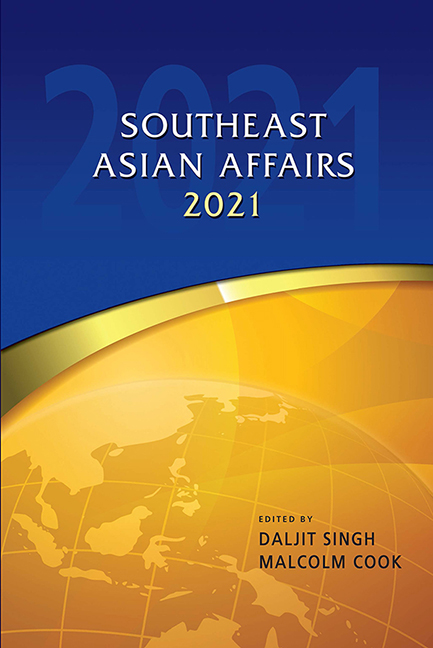Singapore in 2020: The “Crisis of a Generation” – Challenges, Change and Consequences
Published online by Cambridge University Press: 09 October 2021
Summary
A “COVID-ed” Year
Singapore Prime Minister Lee Hsien Loong described the COVID-19 global pandemic as the “crisis of a generation” for Singapore and Singaporeans. The year 2020 was a trying one, with the full ramifications of the crisis indeterminate for politics, economy and society. The imperative to keep Singaporeans safe and to mitigate the severe economic downturn preoccupied the government for much of the year. It saw the government put forth four budgets totalling S$93 billion specifically as countermeasures to the pandemic within a span of a hundred days. With the public health situation under control by the end of the third quarter of 2020, the focus shifted towards “emerging stronger” in the post-pandemic world. Singaporeans also went to the polls in July 2020 where the ruling People's Action Party won a clear mandate, but, arguably, turned in its worst electoral showing since independence. The uncertainty as to who will become the fourth premier resurfaced. Foreign relations remained on an even keel even as the pressing priorities globally were on domestic concerns. Singapore sought to keep supply lines open and ensure food security in a world that became drenched with fear, panic and trepidation. It is an understatement that COVID-19 demonstrated the city-state's continuing vulnerabilities, even though it is in a far stronger position at the end of 2020 to deal with the challenges.
Holding Pattern Adrift
Changi Airport, Singapore's icon of open borders, efficiency and a connected world, was eerily quiet for much of 2020. Air travel plunged dramatically as the pandemic made its visceral presence felt. The imperative and urgency of maintaining Singapore's air hub status took on greater poignancy even as the pandemic reared its ugly head since it “anchors Singapore's place in the world … an attractive node for international business, trade, investment, and tourism” despite it not being, geographically, a natural air hub. COVID-19 “decimated air travel and set us back decades”.
By end August 2020, Changi Airport had lost about half of its air links and over 95 per cent of scheduled passenger services. With that, the aviation and tourism sectors were badly hit. Terminals 2 and 4 were closed.
- Type
- Chapter
- Information
- Southeast Asian Affairs 2021 , pp. 277 - 312Publisher: ISEAS–Yusof Ishak InstitutePrint publication year: 2021

